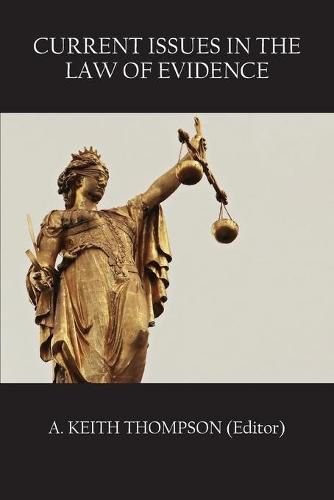Readings Newsletter
Become a Readings Member to make your shopping experience even easier.
Sign in or sign up for free!
You’re not far away from qualifying for FREE standard shipping within Australia
You’ve qualified for FREE standard shipping within Australia
The cart is loading…






This title is printed to order. This book may have been self-published. If so, we cannot guarantee the quality of the content. In the main most books will have gone through the editing process however some may not. We therefore suggest that you be aware of this before ordering this book. If in doubt check either the author or publisher’s details as we are unable to accept any returns unless they are faulty. Please contact us if you have any questions.
The law of evidence is the software the legal system uses to work out who is innocent and who is guilty. This body of law was developed after the 1550s when Queen Mary of England first established prosecutors to accuse those she suspected of assassinating her Catholic officers because England’s Protestant juries would not perform that unpopular function. Queen Mary’s expedient decision enabled English judges to hear and control the evidence that English juries considered when making their convict/acquit decisions for the first time. That control subsequently diluted the jury’s independence and its democratic reputation as the bulwark of liberty.
Should jury independence be restored or should the jury be abolished because judges are better trained and therefore better immunised against the drumbeat of external public opinion in social media? And ism the parliamentary removal of self-incrimination and other libertarian privileges established by judicial and jury interaction after Queen Mary, destined to dilute even the confidentiality we expect when we talk to our lawyers? This short four chapter book exposes some of the assumptions that we unjustifiably make about the virtues of our justice system.
Chapters Include
1 Client Legal Privilege and the Need for a Rationale – Anthony Westenberg
2 Where the Pell Judgment Went Fatally Wrong – John Finnis
3 The jury in its historical perspective – A. Keith Thompson
4 Should the jury be abolished in light of the High Court decision in the Pell case? – Mark Bonanno
$9.00 standard shipping within Australia
FREE standard shipping within Australia for orders over $100.00
Express & International shipping calculated at checkout
This title is printed to order. This book may have been self-published. If so, we cannot guarantee the quality of the content. In the main most books will have gone through the editing process however some may not. We therefore suggest that you be aware of this before ordering this book. If in doubt check either the author or publisher’s details as we are unable to accept any returns unless they are faulty. Please contact us if you have any questions.
The law of evidence is the software the legal system uses to work out who is innocent and who is guilty. This body of law was developed after the 1550s when Queen Mary of England first established prosecutors to accuse those she suspected of assassinating her Catholic officers because England’s Protestant juries would not perform that unpopular function. Queen Mary’s expedient decision enabled English judges to hear and control the evidence that English juries considered when making their convict/acquit decisions for the first time. That control subsequently diluted the jury’s independence and its democratic reputation as the bulwark of liberty.
Should jury independence be restored or should the jury be abolished because judges are better trained and therefore better immunised against the drumbeat of external public opinion in social media? And ism the parliamentary removal of self-incrimination and other libertarian privileges established by judicial and jury interaction after Queen Mary, destined to dilute even the confidentiality we expect when we talk to our lawyers? This short four chapter book exposes some of the assumptions that we unjustifiably make about the virtues of our justice system.
Chapters Include
1 Client Legal Privilege and the Need for a Rationale – Anthony Westenberg
2 Where the Pell Judgment Went Fatally Wrong – John Finnis
3 The jury in its historical perspective – A. Keith Thompson
4 Should the jury be abolished in light of the High Court decision in the Pell case? – Mark Bonanno